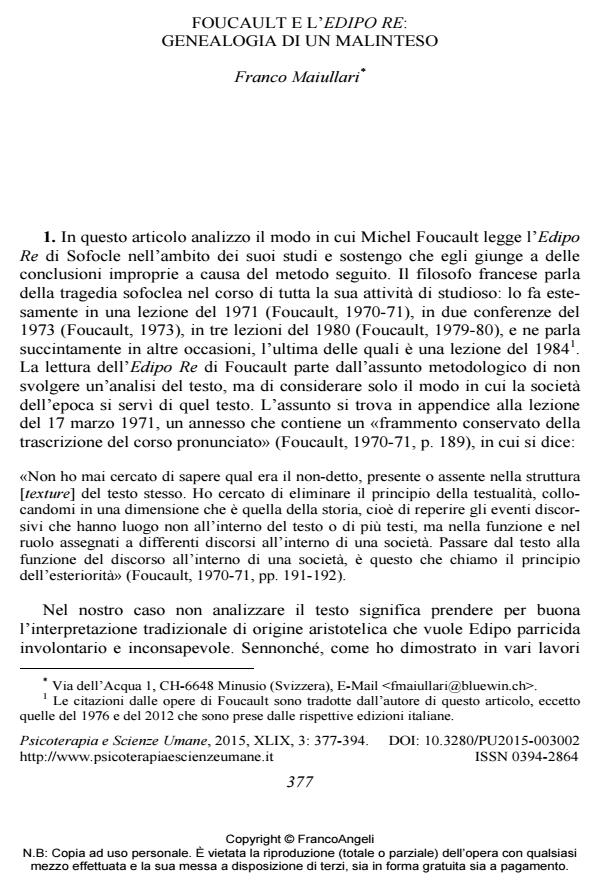Foucault e l’Edipo Re: genealogia di un malinteso
Titolo Rivista PSICOTERAPIA E SCIENZE UMANE
Autori/Curatori Franco Maiullari
Anno di pubblicazione 2015 Fascicolo 2015/3
Lingua Italiano Numero pagine 18 P. 377-394 Dimensione file 134 KB
DOI 10.3280/PU2015-003002
Il DOI è il codice a barre della proprietà intellettuale: per saperne di più
clicca qui
Qui sotto puoi vedere in anteprima la prima pagina di questo articolo.
Se questo articolo ti interessa, lo puoi acquistare (e scaricare in formato pdf) seguendo le facili indicazioni per acquistare il download credit. Acquista Download Credits per scaricare questo Articolo in formato PDF

FrancoAngeli è membro della Publishers International Linking Association, Inc (PILA), associazione indipendente e non profit per facilitare (attraverso i servizi tecnologici implementati da CrossRef.org) l’accesso degli studiosi ai contenuti digitali nelle pubblicazioni professionali e scientifiche.
La tragedia di Edipo è la storia mitologica che ha maggiormente influenzato la cultura del Novecento, in particolare quella filosofica e psicologica. Ne hanno scritto ampiamente anche Foucault e Freud, sennonché entrambi si sono riferiti all’interpretazione tradizionale dell’Edipo Re – quella di origine aristotelica che considera Edipo autore involontario di parricidio e di incesto – la quale, però, a ben analizzare il testo, è un’interpretazione problematica. Dopo aver detto dell’uso improprio della tragedia fatta da Freud (Maiullari, 2011), in questo articolo viene analizzato l’uso altrettanto improprio che ne fa Foucault: in entrambi i casi la questione è di metodo, dato che nessuno dei due studiosi si cimenta con il testo prima di giungere a delle conclusioni. I due articoli si completano nel loro rinviarsi psicologico e filosofico e confermano la necessità di rispettare un testo, alla stregua del rispetto che si deve al testo di un paziente, se non si vuole incorrere in conclusione arbitrarie.
Parole chiave:Foucault, Edipo Re, metodo, anamorfosi, Freud
- Die Omnipotenz von Antigone und die Machtlosigkeit von Ismene: Das Gefühl von Zurückweisung – vom Mythos zur Behandlungspraxis Franco Maiullari, in Zeitschrift für Individualpsychologie /2019 pp.152
DOI: 10.13109/zind.2019.44.2.152
Franco Maiullari, Foucault e l’Edipo Re: genealogia di un malinteso in "PSICOTERAPIA E SCIENZE UMANE" 3/2015, pp 377-394, DOI: 10.3280/PU2015-003002